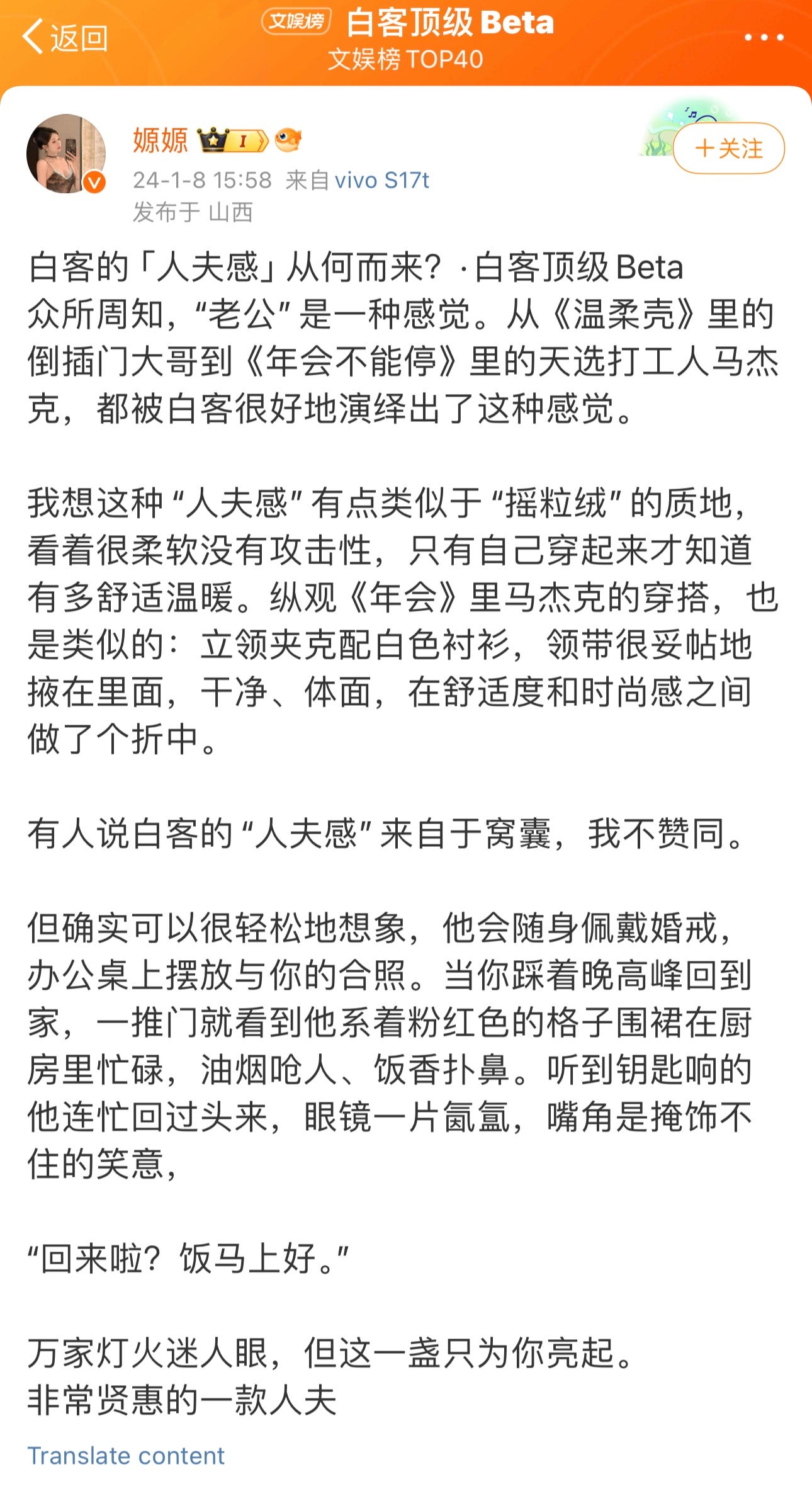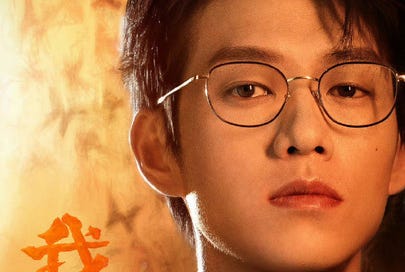Hi there. Welcome to Active Faults.
The kernel of the last issue is my argument that the consumption of celebrities nowadays is less of an aesthetic choice but more of a psychological one. It’s about identifying a specific energy on a subject that inspires an imaginary scenario that satisfies the fan’s psychological need.
Here’s more evidence on that working hypothesis.
I introduced you to Wei Daxun, the black horse who lept out of last year’s heavily bashed series “Fireworks of My Heart” with his depiction of the second male lead 孟宴臣. Always dressed to the nines wearing gold-rimmed glasses, Wei played your textbook romantic-drama-CEO who’s secretly in love with his adopted younger sister, the female lead. Sounds like such an overdone persona, right?
But Wei stole the thunder so thoroughly and pitilessly. The role kind of drove the intolerably cringeworthy main leads out of business, but gave him over 1 million new Weibo followers in one week. A cascade of 孟宴臣 fan edits washed Bilibili anew, with each video averaging 4 to 5 million views and several hundred thousand comments.
This is particularly astonishing considering Wei’s one hell of an oddball of a career. In my memory, he has done almost nothing but minor roles in mediocre series and funny skits on reality shows before this. More widely known as a quipping comedian and a “gagman” than an actor, his looks and reputation all scream incompatibility with romance as a genre. To add to the improbability of his success, 孟宴臣 is a pain to play too. Faintly incestuous and overtly cliche, his charm could easily tip over into problematic realms and become unlikeable after the slightest slip-up in portrayal. And yet he made it.
I had to watch a 3-hour compilation of his entire screen time in “Fireworks” to understand the hype. Not to be dramatic, but I think I got onto something: 孟宴臣’s appeal is freakishly similar to the widowed Patman or Yoon Jeonghan I talked about last time.
It’s that stylised, thorny blend of power and emotional vulnerability. He’s filthy rich, well-educated, and a capable heir to his father’s multimillion business. He’s depressed, controlled by a pathological mother like a puppet and a yearning mess who silently sobs in a fancy bar. There’s a poised air about him that’s somewhat comparable to Mr. Darcy’s upperclassmen gentility, which later cracks to show his internal torment and familial trauma.
We see flashes of 孟宴臣’s anger, aggression and contempt, as well as his self-pity, shame and helplessness. He’s almost villainous with an eerie quirk of collecting rare butterfly specimens, but only because his dream of becoming an entomologist is thwarted by his parents. He mulls over their pretty wings as if they’re his unreachable, forbidden lover. He attends to and protects his sister from the shadows, pathetically and obsessively so. Because the boyfriend is poorly written and portrayed, audiences find themselves rooting for 孟宴臣 when he tries to persuade her out of this borderline toxic relationship or sabotage it. The intervention that’d normally be interpreted as manipulative becomes justified. He’s a conglomerate of contradictions, a ball made out of overstretched rubber bands teetering on the edge of explosion and collapse.
Perhaps “Fireworks” is only belatedly realising this: perfection is not sexy, but tension is. 孟宴臣 the sidekick gets loved and sexualised because his complexity elicits a deluge of antithetical desires. The need to protect him, defend him, succumb to him, gratify him. To placate, to heal as well as to reign over and own. This is heightened by the character’s voluntary celibacy out of devotion. He barely touched anyone throughout the series. The more sex-averse he is, the more margin it leaves for the audience to imagine intimacy with him.
The word cloud I’ve mentally assembled while reading fan comments has a few standouts. “S感” (sadist vibes), “dom感” (dominant vibes) and “daddy” are among them, as well as “渣苏” (‘fuckboy charms’), “禁欲” (celibate), “变态” (perverted) and “疯批” (mad pussy). Although these are pretty common descriptors for a celebrity nowadays, it’s rare for one character to have them all. Like Patman, there’s that “chaotic beauty” about 孟宴臣. People identify distinct but not disparate energies on him to fulfil their psychological needs. In the eye of this chaos there’s a formula of success for any character or celebrity: powerful fragility.
The repute of 孟宴臣 is undeniably a culmination of external factors, Wei’s personal life being one of them. He was born in the industrialised Northeast, a small-town kid who grew up overweight but fought his way into China’s top performative arts academy. Frequently seen as the butt of the joke in reality shows, he sported a light-hearted boy-next-door vibe in these appearances. He is openly affectionate with his parents and comfortable enough with his masculinity he wore drag for work on more than one occasion. His rumoured relationships with older female actresses like Yang Mi and Qin Lan gave him a golden-retriever-younger-boyfriend aura. In stark contrast with 孟宴臣 the character, Wei outside of “Fireworks” seems sweet and innocuous.
This is the contradiction that truly made his name: ambivalent goodness. Different from the Batman/Robert Pattinson duo, fan edits of Wei emphasize both the actor and the character because they’re in a feedback loop with each other. Cultural stereotypes that pinpoint Northeasterns as roguish enhance 孟宴臣’s delicious bestiality. 孟宴臣’s slyness and threatening intelligence as a businessman is tamed by Wei’s harmless approachability. A balance is thus achieved where he’s interestingly complex and good. His case is truly a one-of-a-kind occurrence that comes down to a lot of luck.
The Sweetheart Godfather is born.
This intense browsing got my Bilibili algorithm thinking I’m in love with Wei Daxun, and my Recommended videos have shifted. The more I watch, the more I see a connection between Wei’s success and other phenomena in fanquan, like the emergence of “茶感” (tea vibes meaning “pick-me girl” vibes), “男狐狸精” (male femme fatale) or “男小三” (male homewrecker) as flattering epithets for men. Originally gendered as feminine, these terms are being reclaimed by (largely female) fans to compliment a specific energy not without bitterness or vindication. They describe, like in the case of widowing and step-mum-ification, a kind of calculated but well-meaning enticement with the goal of winning their lover over. Seduction and competition for attention are translated into dedication to being a loyal partner. That makes the immorality excusable. Interesting but true and good.
This is why Wei Daxun’s “sadist vibes” can be lauded but when someone like Qu Chuxiao actually practices pseudo-BDSM and refers to his girlfriend as his “slave” “bitch” or “human toilet”, the latter is less tolerated. The lead of the famed “Wandering Earth” saga got into controversy after his ex leaked a series of obscene texts that were sexual abuse disguised as kinks. Real BDSM practitioners criticised Qu for blackening their name: sadists are supposed to be protectors at the same time. You can appear to be bad, but you must be inherently good.
Ambivalent goodness, powerful fragility. Be a saintly human and a broken God.
One of the most-viewed edits of Wei is entitled the “New Chinese CEO” (新中式总裁). The background music is decidedly not a classic TikTok track like “Such a Whore”, but a Chinese classical music track by Jay Chou. In the video, 孟宴臣 presents as the Chinese “君子”, a courteous, reserved, scholarly and respectable nobleman. Comments fan over his “calming” energy and his “classical romance” (古典浪漫) that is basically Confucian reticence and restraint.
I’m reminded of Bai Ke, the comedian-turned-actor who experienced a similar learning curve like Wei and became the nation’s most beloved “Beta”. In the fandom kink trope of the ABO universe, humans have a secondary gender, Alpha, Beta or Omega in addition to their primary genders of male and female. Betas are known as the most “normal” group with human anatomy, unlike Omegas who can bear children even when they’re male. They’re unaffected by “pheromones”, “heats” or “ruts” that can prompt Omegas and Alphas to crave sex out of a primal, breeding instinct. It is up to individual authors to decide what Betas mean in their works, but more often than not, they are almost rendered “sexless” and mundane.
Like Wei, Bai Ke is not your usual rom-com prince with chiseled cheekbones and Jacob Elordi’s eyes. He became popular because of the Beta-ish tenderness of one of his roles. He played a perfect everyday lover who lacks looks too attractive that are out of reach, rough edges and an overbearing gusto.

Neither me nor my Bibili algorithm can handle any more binge-watching of edits, so I’m stopping here with one last observation. There is a decline of the traditional 霸道总裁 and the rise of Zhongyong men. A character in equilibrium, suspended in the space between power and vulnerability, wildness and propriety. Like congee, perhaps. This metaphor might sound ridiculous, but hear me out.
The essence of them has to be pure, accessible and common, like water and rice. They have to be reassuringly bland, never greasy or flashy. Affectionately, softly and straightforwardly powerful. Humble, homey, realistic and unassuming.
Take notes, neiyu men.






